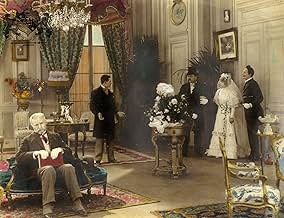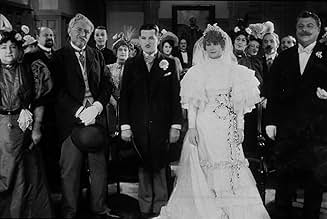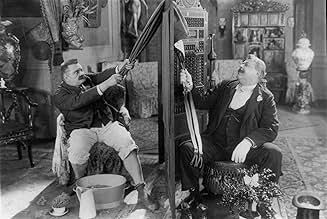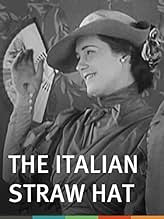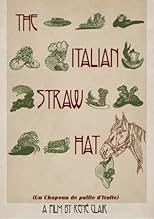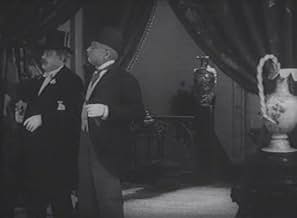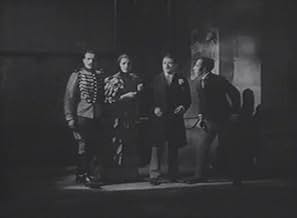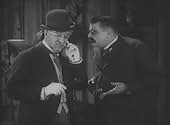AVALIAÇÃO DA IMDb
6,8/10
979
SUA AVALIAÇÃO
Adicionar um enredo no seu idiomaOn his way through the woods to his marriage, Fadinard's horse eats the hat of a married lady spending here a few moments with her lover. Fadinard has to find the very same rare hat to avoid... Ler tudoOn his way through the woods to his marriage, Fadinard's horse eats the hat of a married lady spending here a few moments with her lover. Fadinard has to find the very same rare hat to avoid her dishonor. This will greatly disturb his own marriage.On his way through the woods to his marriage, Fadinard's horse eats the hat of a married lady spending here a few moments with her lover. Fadinard has to find the very same rare hat to avoid her dishonor. This will greatly disturb his own marriage.
- Direção
- Roteiristas
- Artistas
Alice Tissot
- Une cousine
- (as Mme Alice Tissot)
Alexej Bondireff
- Un cousin
- (as M. Alexis Bondi)
Marise Maia
- La mariée
- (as Mlle Maryse Maia)
Yvonneck
- Nonancourt
- (as M. Yvonneck)
Louis Pré Fils
- Cousin Bobin
- (as M. Pré fils)
Albert Préjean
- Fadinard, le marié
- (as M. Albert Préjean)
Geymond Vital
- Le lieutenant Tavernier
- (as M. Vital Geymond)
Olga Tschechowa
- Anaïs de Beauperthuis
- (as Mme Olga Tschekova)
Paul Ollivier
- L'oncle Vézinet
- (as M. Paul Olivier)
Alex Allin
- Félix
- (as M. Alex Allin)
André Volbert
- Le maire
- (as M. Volbert)
Jim Gérald
- Beauperthuis
- (as M. Jim Gérald)
Lya Christy
- Une invitée de la noce
- (as Christie)
Nino Constantini
- Un invité de la noce
- (as Nino Costantini)
A. Debriège
- Une invitée de la noce
- (as Albany Debriège)
- Direção
- Roteiristas
- Elenco e equipe completos
- Produção, bilheteria e muito mais no IMDbPro
Avaliações em destaque
I just looked at Rene Clair's "An Italian Straw Hat" for the second time -- the first time in a dozen years and though I am now aware of potential issues with the viewing process -- like most late silent pictures, it almost certainly plays better with an audience -- seeing it by myself on my TV, it again falls a bit flat. The last time it was on a mediocre VHS copy. This time it was on the beautifully transferred Flicker Alley DVD.
This weakness surprised me the first time I saw it, since I am a great fan of Clair's sound films, as well as his silent short subjects, but I think I have identified at least part of the problem: I think Clair was directing under close supervision by someone who expected to see Labiche's play on the screen. As Clair's great films were always surrealistic, clearly in a world disjoint from the one we see around us, how could he be expected to to force the viewer into his own world? Even the way the characters are dressed and shot is typical of early French films -- one of the DVD extras is a Zecca short from 1906 or 1908, ""After the Wedding" and those characters were virtually dropped into Clair's picture -- so at least I now understand that we are dealing with then-current stage conventions.
Most of the movie looks as if it could have been directed by Louis Feullade: it has the placidly sardonic, observant camera, although it lacks the air of emotional reality that Feuillade's seemingly-improvised movies had: some of the wilder parts of LES VAMPIRE look as if he realized he had written himself into a corner, and there's one of his earlier movies in which the characters have to mail a letter, so they take a hot-air balloon to a mail box and I suddenly realized that the producer had given them a balloon and Feuillade used it because it would look cool and it was already paid for.
Albert Préjean, one of Clair's regulars at this point -- he was magnificent in "Sous les Toits de Paris" -- attempts the lead role with an air of depression. Unfortunately, while this may be appropriate to the character, given that he is watching his life unravel, the flat affect of depression is not terribly interesting for the audience.
It is only about two-thirds of the way through that Clair asserts his authority by showing us what's going on in Préjean's mind as houses begin to fall apart. But while this revived my interest, the tight plotting of Labiche's play took over again and I could see the wheels spinning neatly over the tracks of the story.
Ultimately, this is a superior silent version of an excellent 19th Century farce and should keep the dedicated silent enthusiast engrossed. However, for the fan of Rene Clair, it is a bit patchy.
I watched the movie with the Alloy Orchestra's soundtrack playing -- their arrangements are usually solid and supportive. If I enjoy a silent movie, I usually don't consciously notice the soundtrack, so the fact that I think that their polite-sounding orchestrations of late 19th and early 20th century program music is entirely appropriate is a bit of a put-down. It is certainly not their fault that I am familiar with one of the tunes through its use by Allen Sherman for one his comic rewrites: in this case, I kept hearing him singing his sardonic "Lots of Luck."
This weakness surprised me the first time I saw it, since I am a great fan of Clair's sound films, as well as his silent short subjects, but I think I have identified at least part of the problem: I think Clair was directing under close supervision by someone who expected to see Labiche's play on the screen. As Clair's great films were always surrealistic, clearly in a world disjoint from the one we see around us, how could he be expected to to force the viewer into his own world? Even the way the characters are dressed and shot is typical of early French films -- one of the DVD extras is a Zecca short from 1906 or 1908, ""After the Wedding" and those characters were virtually dropped into Clair's picture -- so at least I now understand that we are dealing with then-current stage conventions.
Most of the movie looks as if it could have been directed by Louis Feullade: it has the placidly sardonic, observant camera, although it lacks the air of emotional reality that Feuillade's seemingly-improvised movies had: some of the wilder parts of LES VAMPIRE look as if he realized he had written himself into a corner, and there's one of his earlier movies in which the characters have to mail a letter, so they take a hot-air balloon to a mail box and I suddenly realized that the producer had given them a balloon and Feuillade used it because it would look cool and it was already paid for.
Albert Préjean, one of Clair's regulars at this point -- he was magnificent in "Sous les Toits de Paris" -- attempts the lead role with an air of depression. Unfortunately, while this may be appropriate to the character, given that he is watching his life unravel, the flat affect of depression is not terribly interesting for the audience.
It is only about two-thirds of the way through that Clair asserts his authority by showing us what's going on in Préjean's mind as houses begin to fall apart. But while this revived my interest, the tight plotting of Labiche's play took over again and I could see the wheels spinning neatly over the tracks of the story.
Ultimately, this is a superior silent version of an excellent 19th Century farce and should keep the dedicated silent enthusiast engrossed. However, for the fan of Rene Clair, it is a bit patchy.
I watched the movie with the Alloy Orchestra's soundtrack playing -- their arrangements are usually solid and supportive. If I enjoy a silent movie, I usually don't consciously notice the soundtrack, so the fact that I think that their polite-sounding orchestrations of late 19th and early 20th century program music is entirely appropriate is a bit of a put-down. It is certainly not their fault that I am familiar with one of the tunes through its use by Allen Sherman for one his comic rewrites: in this case, I kept hearing him singing his sardonic "Lots of Luck."
10insomnia
I recently saw "The Italian Straw Hat" for the second time; on the silver screen yet! The plot is simple.A horse chews up a lady's straw hat.Her escort demands that it be replaced. This leads to all manner of complications. Slight? Perhaps. Funny? Absolutely hilarious - with not a word spoken!! If any reader gets a chance to see this film, or Clair's 'American' films - "The Ghost Goes West", "And Then There Were None", and: "I Married A Witch" - DO!
Report from Cinesation 2006: AN Italian STRAW HAT (***) Rene Clair had a huge reputation in the early days of sound, and though it's not hard to see why, it is hard to see why the same critics who loved his films (often voting them onto the early Sight & Sound lists of the best films of all time) were dismissive of great Hollywood comedies with exactly the same virtues. (A Nous la Liberte and Le Million are delightful, for instance, but in no way that Duck Soup and Top Hat aren't equally or more delightful.)
This-- based on a perennial stage farce about the complications that follow when a horse eats a married woman's hat while she's off dallying with her lover-- is skillful enough, and it has a few very funny moments, but made mostly in medium or longshot with little subtlety in the playing, it seemed far more primitive for 1927 than, to pick one American comedy, Kiki (shown earlier the same day)-- and the audience at Cinesation didn't laugh nearly as often, either.
This-- based on a perennial stage farce about the complications that follow when a horse eats a married woman's hat while she's off dallying with her lover-- is skillful enough, and it has a few very funny moments, but made mostly in medium or longshot with little subtlety in the playing, it seemed far more primitive for 1927 than, to pick one American comedy, Kiki (shown earlier the same day)-- and the audience at Cinesation didn't laugh nearly as often, either.
I should point out from the outset that I was probably in the wrong frame of mind for a movie like this. Today was a pretty extreme example of "one of those days" for me. I sat down to watch this, definitely wanting a laugh. But any movie was going to have to work extra hard to get a laugh out of me on this crappy day, and this one didn't really do the job. I should have probably gone with something simple and sure-fire, like a Buster Keaton movie, or a Woody Allen, or a Monty Python. Or maybe I should have just gone for a long bike ride. But I watched this instead.
This is one of those society comedies, with a large cast of characters, and various complicated goings on. Most of the humor derives from people trying to put a normal happy face on for the benefit of society, while meanwhile things are spinning out of control beneath the surface. It reminded me a little bit of Fawlty Towers, with John Cleese, for some reason. It's the same kind of humor. You've probably seen a lot of the gags in 10,000 TV sitcoms by now, but I suppose this stuff was a lot fresher in 1927. And most of it was pretty well done, I'll admit.
The story itself is simple, but you have to pay a lot of attention to keep track of all the moment-to-moment details. And I guess that's where the movie failed for me today. My mind kept wandering, and I'd have to rewind the tape to figure out what was going on, and I'd get annoyed. I was really feeling the lack of dialogue in this one. I watch a lot of silent films. They appeal to me for some reason I can't explain. But this movie felt incomplete to me. I felt it would have worked better as a talkie. But maybe it was just the mood I was in.
Anyway, there were several individual scenes that I thought were brilliant, and definitely made me sit up and take notice. One was worthy of a Seinfeld episode: it's a wedding scene; a woman notices her husband's necktie is undone, and she repeatedly nudges him and fiddles with her neck. The husband takes no notice. He sits there like a lump. But another character instinctively reaches to check his tie. This starts a chain reaction, and pretty soon everyone in the church is checking their ties, except for the husband, who's still sitting there oblivious. Another great scene is when the groom at the wedding imagines the angry military man back at his house, vandalizing everything, tossing all his possessions out the windows, tearing down walls--the film lapses into total surrealism; this is Rene Clair at his visual best. I love this scene.
For now, I'm going to rate this a 7/10. But I'll try to catch it again some day, when I'm in a better and more attentive mood, and I think I'll like it a lot better.
This is one of those society comedies, with a large cast of characters, and various complicated goings on. Most of the humor derives from people trying to put a normal happy face on for the benefit of society, while meanwhile things are spinning out of control beneath the surface. It reminded me a little bit of Fawlty Towers, with John Cleese, for some reason. It's the same kind of humor. You've probably seen a lot of the gags in 10,000 TV sitcoms by now, but I suppose this stuff was a lot fresher in 1927. And most of it was pretty well done, I'll admit.
The story itself is simple, but you have to pay a lot of attention to keep track of all the moment-to-moment details. And I guess that's where the movie failed for me today. My mind kept wandering, and I'd have to rewind the tape to figure out what was going on, and I'd get annoyed. I was really feeling the lack of dialogue in this one. I watch a lot of silent films. They appeal to me for some reason I can't explain. But this movie felt incomplete to me. I felt it would have worked better as a talkie. But maybe it was just the mood I was in.
Anyway, there were several individual scenes that I thought were brilliant, and definitely made me sit up and take notice. One was worthy of a Seinfeld episode: it's a wedding scene; a woman notices her husband's necktie is undone, and she repeatedly nudges him and fiddles with her neck. The husband takes no notice. He sits there like a lump. But another character instinctively reaches to check his tie. This starts a chain reaction, and pretty soon everyone in the church is checking their ties, except for the husband, who's still sitting there oblivious. Another great scene is when the groom at the wedding imagines the angry military man back at his house, vandalizing everything, tossing all his possessions out the windows, tearing down walls--the film lapses into total surrealism; this is Rene Clair at his visual best. I love this scene.
For now, I'm going to rate this a 7/10. But I'll try to catch it again some day, when I'm in a better and more attentive mood, and I think I'll like it a lot better.
"Un Chapeau De Paille D'Italie" can be considered, by this German count's standards, as a transgressor silent film in spite of its classical conventionalism; this particular Teutonic riddle has a Germanic and even logical explanation that will be understood by the longhaired silent youngsters around the world right now.
"Un Chapeau De Paille D'Italie" was directed by the great but French silent director Herr René Clair in the silent year of 1928, after he had directed important, avant-garde, experimental and overall, non conventional silent oeuvres such "Entr'acte" (1924), "Paris Qui Dort" (1925), "Le Voyage Imaginaire" (1925) or "La Tour" (1928); so, having this in mind, then the Germanic assessment mentioned before by this Herr Graf has a solid basis. "Un Chapeau " is a completely different and classic film in comparison with those earlier Clair films and this doesn't mean that "Un Chapeau " is a minor work in Herr Clair 's career; on the contrary, the film is a remarkable, stylized and even provocative comedy.
The incident of the Italian straw hat occurs just before our hero marries, and leads to a series of well placed and paced episodes. The elegant and hilarious scenes depicting the troubles and crossed situations among the just married couple and their wedding guests with the adulterous couple, achieve very remarkable moments. The skillful use of the camera emphasizes the rhythm depending the different scenes, and includes the camera tricks and techniques that Herr Clair was so fond of. The result is a vigorous and sophisticated comedy with a irreverent undercurrent subject in the main plot: a just married man must assume the complicated task of protecting an adulterer.
Helping our hero in such a hazardous mission are excellent supporting actors, playing peculiar characters who are involved unnoticed in this peculiar wedding and will suffer the happenings around the Italian straw hat, a hilarious gallery of guests who have had the misfortune to be part of such a troublesome wedding.
The film is placed at the end of the old XIX century probably in order to take advantage of the human behaviours and fashion of those old times in which the ladies wore elegant hats ( those fräuleins of nowadays showing their loose hair in public!, Mein Gott! ). There is a careful atmosphere of ancient and decadent custom ( faithful characteristics, after all, in Herr Clair films ) that suits the film perfectly. Herr Clair has directed a "classic", stylized and cynical silent comedy that has the same original merits of his most experimental early works.
And now, if you'll allow me, I must temporarily take my leave because this German Count must find his Prussian helmet in order to eat his breakfast properly.
"Un Chapeau De Paille D'Italie" was directed by the great but French silent director Herr René Clair in the silent year of 1928, after he had directed important, avant-garde, experimental and overall, non conventional silent oeuvres such "Entr'acte" (1924), "Paris Qui Dort" (1925), "Le Voyage Imaginaire" (1925) or "La Tour" (1928); so, having this in mind, then the Germanic assessment mentioned before by this Herr Graf has a solid basis. "Un Chapeau " is a completely different and classic film in comparison with those earlier Clair films and this doesn't mean that "Un Chapeau " is a minor work in Herr Clair 's career; on the contrary, the film is a remarkable, stylized and even provocative comedy.
The incident of the Italian straw hat occurs just before our hero marries, and leads to a series of well placed and paced episodes. The elegant and hilarious scenes depicting the troubles and crossed situations among the just married couple and their wedding guests with the adulterous couple, achieve very remarkable moments. The skillful use of the camera emphasizes the rhythm depending the different scenes, and includes the camera tricks and techniques that Herr Clair was so fond of. The result is a vigorous and sophisticated comedy with a irreverent undercurrent subject in the main plot: a just married man must assume the complicated task of protecting an adulterer.
Helping our hero in such a hazardous mission are excellent supporting actors, playing peculiar characters who are involved unnoticed in this peculiar wedding and will suffer the happenings around the Italian straw hat, a hilarious gallery of guests who have had the misfortune to be part of such a troublesome wedding.
The film is placed at the end of the old XIX century probably in order to take advantage of the human behaviours and fashion of those old times in which the ladies wore elegant hats ( those fräuleins of nowadays showing their loose hair in public!, Mein Gott! ). There is a careful atmosphere of ancient and decadent custom ( faithful characteristics, after all, in Herr Clair films ) that suits the film perfectly. Herr Clair has directed a "classic", stylized and cynical silent comedy that has the same original merits of his most experimental early works.
And now, if you'll allow me, I must temporarily take my leave because this German Count must find his Prussian helmet in order to eat his breakfast properly.
Você sabia?
- CuriosidadesRestored in April 2016 through a partnership between the Cinematheque Francaise and the San Francisco Silent Film Festival, with the support of the CNC and Arte France. The new 4K restoration is based on the René Clair's original camera negative which is preserved at the Cinematheque Francaise.
- Erros de gravaçãoAfter the chair has been loaded onto the cart in a medium shot, the next long shot shows it in a different position.
- Versões alternativasThere is an Italian edition of this film on DVD, distributed by DNA srl, "UN CAPPELLO DI PAGLIA DI FIRENZE (1928) + I MARRIED A WITCH (Ho sposato una strega, 1942)" (2 Films on a single DVD), re-edited with the contribution of film historian Riccardo Cusin. This version is also available for streaming on some platforms.
- ConexõesFeatured in Historia del cine: Epoca muda (1983)
Principais escolhas
Faça login para avaliar e ver a lista de recomendações personalizadas
Detalhes
- Data de lançamento
- Países de origem
- Idiomas
- Também conhecido como
- Um Chapéu de Palha da Itália
- Locações de filme
- Empresa de produção
- Consulte mais créditos da empresa na IMDbPro
- Tempo de duração
- 1 h 48 min(108 min)
- Cor
- Mixagem de som
- Proporção
- 1.33 : 1
Contribua para esta página
Sugerir uma alteração ou adicionar conteúdo ausente

